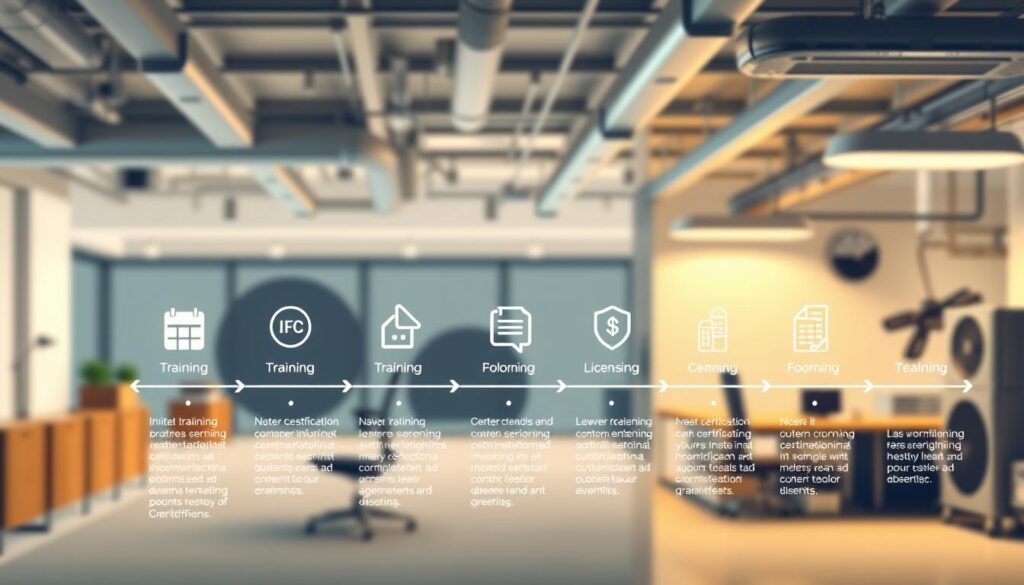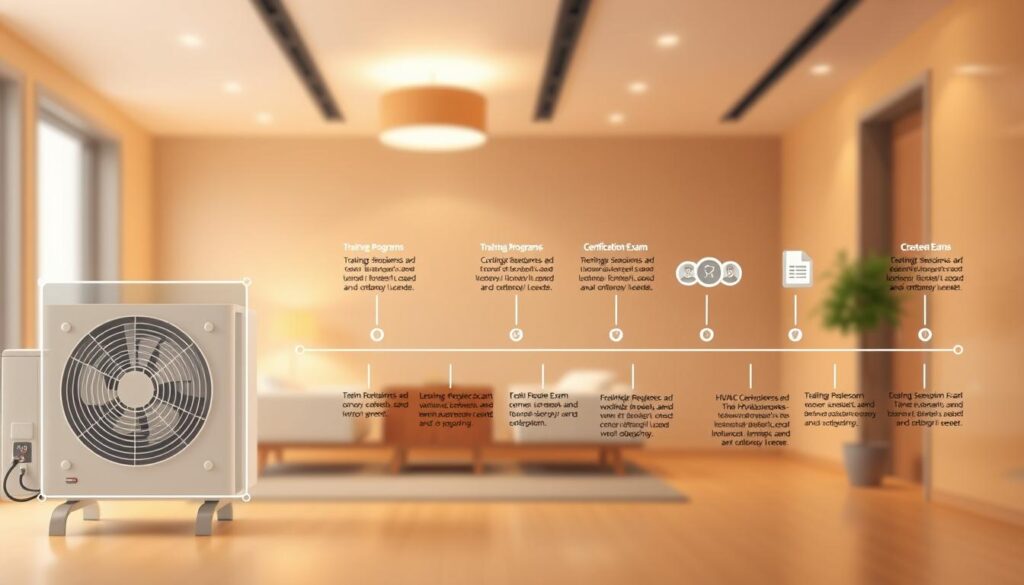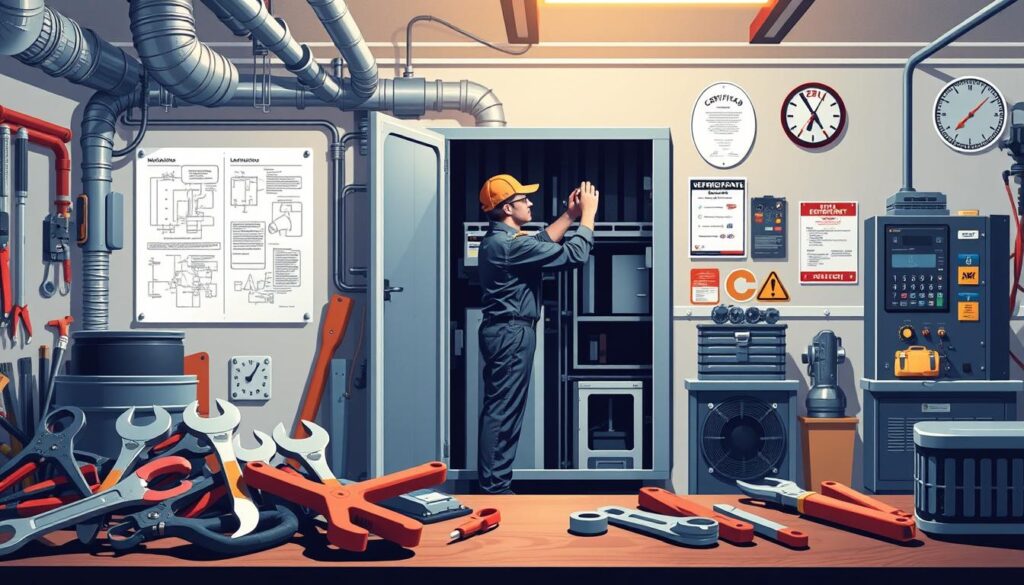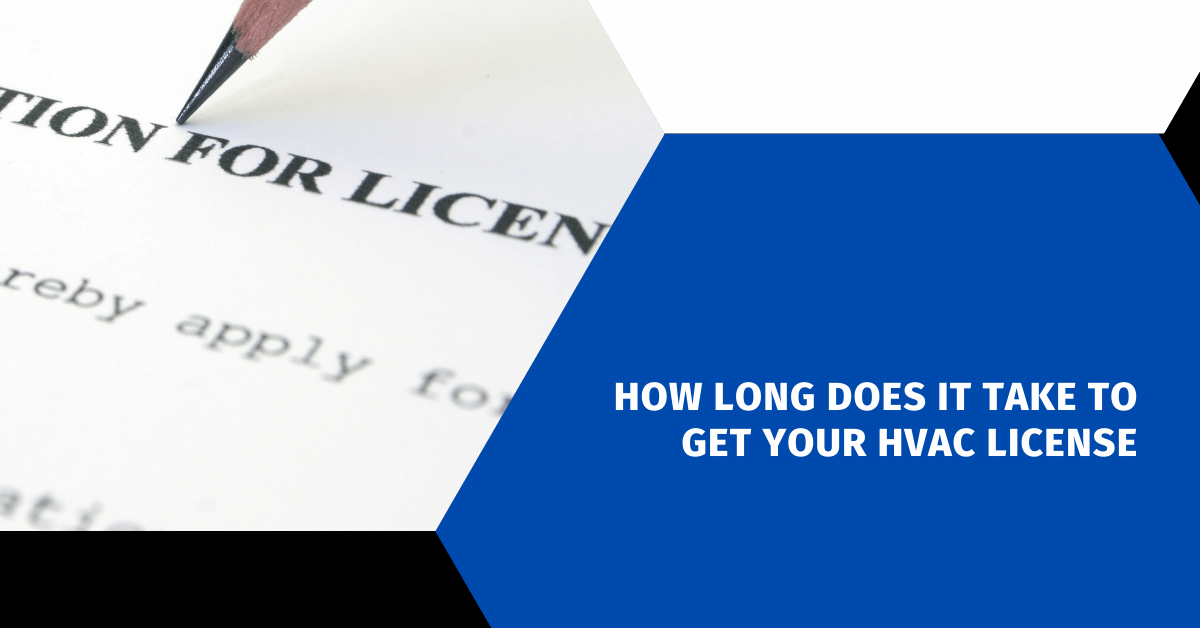Affiliate Disclosure
HVAC Guide Guys is a participant in the Amazon Services LLC Associates Program, an affiliate advertising program designed to provide a means for sites to earn advertising fees by advertising and linking to Amazon.
How Long Does It Take to Get Your HVAC License? Are you curious about the time it takes to become a licensed HVAC pro? Getting your HVAC license is not just a quick process. It’s a serious career move that needs dedication, training, and hands-on experience.

In Texas, getting your HVAC certification takes at least four years. This might seem long, but you can start working as a registered tech under a licensed contractor. This way, you gain valuable experience while you’re on your way to full certification.
The time it takes to get your HVAC license varies. It depends on your education, training program, and how much time you put into it. Usually, it takes 2-5 years of training and experience to become fully licensed.
Key Takeaways
- HVAC licensing typically requires 4-5 years of total preparation
- You can work in the field while pursuing your full certification
- Multiple certification paths are available for HVAC professionals
- Practical experience is key to getting your license
- Certification can greatly boost your career chances
Table of Contents
Understanding HVAC Licensing Requirements in Texas
Texas has a clear path for HVAC professionals to start their careers. With about 31,910 HVAC mechanics and installers, knowing the licensing rules is key. It helps those new to the field.
Getting through the HVAC license exam and training needs focus on state rules. The Texas Department of Licensing & Regulation checks if professionals are up to par. They make sure everyone has the right skills and knowledge.
Basic Eligibility Criteria
To get an HVAC license in Texas, you need to meet a few basic requirements:
- Be at least 18 years old
- Show you have practical work experience
- Finish the needed hvac training programs
- Pass the state’s licensing exam
License Classes and Types
Texas has two main HVAC license types. They match different job levels:
| License Class | System Capacity | Permitted Work |
|---|---|---|
| Class A License | Any size unit | Full-scale HVAC installations and repairs |
| Class B License | 25 tons cooling and 1.5 million BTUs heating | Limited system installations and maintenance |
State Regulatory Bodies
The Texas Department of Licensing & Regulation watches over HVAC pros. They handle licensing, set standards, and keep everyone safe. They do this by making sure everyone passes the hvac license exam and keeps learning.
Professional tip: Always check with the state agency to make sure you meet the licensing rules.
Explore Our HVAC Shop
Looking for top-rated HVAC tools, parts, and accessories? Visit our shop and find the perfect solution for your needs.
Visit the ShopRequired Experience and Training Paths
Getting an HVAC license needs a smart plan to get the right experience and training. Your path to becoming a licensed HVAC pro has many ways. These mix hands-on skills with formal learning.
To get an HVAC license, you must gain a lot of work experience. You usually need:
- 48 months of work under a licensed contractor
- Work done in the last 72 months
- Getting technical skills through hands-on work
The length of an HVAC apprenticeship depends on your training choice. Full apprenticeships last four to five years. They teach you about both home and business HVAC systems. You’ll learn in classes and get real-world experience.
There are quicker ways to get your license:
- Vocational school programs
- Community college HVAC tech certificates
- Associate degrees in HVAC
Finishing a vocational training program can replace up to three years of work experience. This makes your licensing process faster. It also helps you learn skills that employers want.
Your training should include important topics like heating, cooling, and refrigeration. Good education and hands-on experience are key to a great HVAC career.
HVAC License Classes and Endorsements
Understanding hvac contractor licensing can be tricky. Knowing about different license classes and endorsements is key for your HVAC career. These categories show what work you can do and the jobs you can get.
Class A License Requirements
A Class A license lets you work on any HVAC system, big or small. This license gives you the most freedom in your career:
- Permits work on large commercial and industrial HVAC systems
- No restrictions on cooling or heating unit capacities
- Highest level of professional authorization
Class B License Specifications
The Class B license offers good job chances but with some limits:
- Restricted to cooling systems up to 25 tons
- Heating systems limited to 1.5 million BTUs/hour
- Ideal for residential and small commercial projects
Available Endorsement Options
To focus your hvac contractor licensing, you can get special endorsements:
- Environmental Air Conditioning – Focuses on climate-controlled environments
- Commercial Refrigeration – Specializes in refrigeration systems
- Process Cooling or Heating – Targets industrial cooling and heating applications
Each endorsement lets you do more in your HVAC career and might raise your pay.
Explore Our HVAC Shop
Looking for top-rated HVAC tools, parts, and accessories? Visit our shop and find the perfect solution for your needs.
Visit the ShopHow Long Does It Take to Get Your HVAC License

Getting your HVAC license is a journey that usually takes 3-5 years. The time it takes depends on your education, work experience, and state rules.
To become a licensed HVAC pro, you go through several steps:
- Complete an educational program (6-24 months)
- Get the needed work experience (2-4 years)
- Pass state licensing exams
The cost of getting your HVAC license varies. It’s usually between $500 to $2,000. This includes training, exam fees, and application costs. Apprenticeships are a good option, lasting 3-5 years. They mix classroom learning with hands-on training.
Different states have their own rules for getting licensed. For example:
- California needs four years of experience in the last decade
- Arizona accepts four years of specialty experience or two years plus specific education
- Connecticut requires a registered apprenticeship program
Your speed and dedication will decide how fast you get your HVAC license. Full-time students and apprentices usually finish faster than part-time ones.
Educational Requirements and Training Programs
If you want to start a career in HVAC, knowing the educational landscape is key. HVAC training programs lay the groundwork for becoming a skilled professional. With over 415,800 HVAC mechanics and installers in the U.S., there are many ways to enter this field.
- Training programs last from 6 to 24 months.
- Certificate programs need about 30 credits.
- Associate degree programs require around 60 credits.
- Apprenticeships can last 2 to 5 years.
Approved HVAC Schools
When choosing HVAC training, look for accredited schools. The Tennessee College of Applied Technology has 18 campuses, all accredited by HVAC Excellence. These programs ensure you get quality education that meets industry standards for HVAC certification.
Program Duration and Costs
HVAC certification programs vary in length and cost. Prices range from $1,200 to $15,000. Some programs, like ForgeNow, offer seven-week courses that let you earn multiple certifications fast.
Certification Options
There are many certification paths to boost your career. NATE (North American Technician Excellence) offers exams for different skill levels. HVAC Excellence has certifications from student assessments to master specialist levels. These can greatly improve your job prospects in the HVAC market.
Invest in your education and certification to unlock exciting opportunities in the HVAC industry!
Explore Our HVAC Shop
Looking for top-rated HVAC tools, parts, and accessories? Visit our shop and find the perfect solution for your needs.
Visit the ShopWork Experience Requirements for Licensing

Gaining practical experience is key in the HVAC licensing process. In Texas, contractors need specific work experience to get their license. They must complete 48 months of verified work experience in the last 72 months under a licensed contractor’s watch.
Your HVAC apprenticeship duration is important for meeting licensing needs. Here are the main work experience points:
- Minimum of 4 years practical experience
- Work must be completed under a licensed contractor
- Experience should be within the last 6 years
- Documented proof of supervised work is essential
The HVAC licensing process requires detailed documented experience. You can qualify through different paths:
- 4 years of full-time practical experience
- 1 year of technical school + 3 years work experience
- Verified apprenticeship program documentation
It’s important to keep track of your work hours carefully. Keep detailed records of projects, supervision, and tasks done during your apprenticeship. This info is key when applying for your HVAC license.
Explore Our HVAC Shop
Looking for top-rated HVAC tools, parts, and accessories? Visit our shop and find the perfect solution for your needs.
Visit the ShopHVAC Licensing Exam Process and Preparation
Getting ready for your HVAC license exam needs careful planning and a deep understanding of the process. This exam is a big step in your career, checking your HVAC knowledge and skills.
The requirements for your HVAC certification vary based on the license class you aim for. Each state has its own exam format, but they all aim to test your technical and practical skills.
Exam Structure and Content
The HVAC licensing exam usually has multiple-choice questions on key topics:
- HVAC system installation techniques
- Refrigeration principles
- Electrical systems
- Safety regulations
- Local building codes
Exams typically last from three to four hours. You’ll need to study hard and use smart study methods.
Study Resources
Good preparation means using many study tools:
- Official state licensing study guides
- Practice examination materials
- Online training courses
- Professional HVAC training workshops
Testing Locations
State boards manage exam locations. You must register early and show proof of your eligibility.
| Exam Type | Questions | Time Limit | Passing Score |
|---|---|---|---|
| Class A License | 120 questions | 4 hours | 70% |
| Class B License | 100 questions | 3 hours | 70% |
Pro tip: Begin preparing early, use many study resources, and practice with sample exams to boost your success chances.
Insurance and Business Requirements
Getting an hvac contractor license means you must know the business and insurance rules. Your success depends on following legal and financial standards. These protect your business and your clients.
Important insurance needs for HVAC pros include:
- Commercial general liability insurance
- Workers’ compensation coverage
- Contractor’s bond
The cost of getting an hvac license includes more than just fees. You’ll also need to plan for insurance and bonding costs. These vary by state and license type.
| Insurance Type | Minimum Coverage | Estimated Annual Cost |
|---|---|---|
| General Liability | $300,000 per occurrence | $500 – $1,200 |
| Workers’ Compensation | Mandatory for companies with employees | $1,500 – $3,000 |
| Contractor’s Bond | $25,000 typical requirement | $250 per year |
More business needs include:
- Registering your business entity
- Getting local permits
- Keeping up with financial records
- Following state licensing board rules
Tip: Always talk to a local insurance expert. They can help make sure you meet all state and license needs.
Explore Our HVAC Shop
Looking for top-rated HVAC tools, parts, and accessories? Visit our shop and find the perfect solution for your needs.
Visit the ShopEPA Certification Requirements
If you want to be an HVAC technician, knowing about EPA certification is key. In the U.S., every technician who works with refrigerants must have EPA 608 certification. This shows they follow federal environmental rules and are skilled in using sensitive equipment.
The EPA has four certifications for different needs. Type I is for small appliances, Type II for high-pressure ones, Type III for low-pressure, and Universal for all. Most HVAC pros pass the exam on their first try, with a 75% success rate.
Getting your HVAC certification usually takes 3-4 weeks. This includes training and getting ready for the exam. Most technicians get certified in under 6 months. The exam has 25 questions, and you need to get 18 right. Also, 90% of HVAC employers require this certification, which helps you earn more and advance in your career.
Many places offer training for HVAC certification. These include community colleges, technical schools, and HVAC training centers. While EPA 608 doesn’t expire, it’s good to keep up with new rules and practices. Getting certified boosts your skills and opens up more job opportunities in HVAC.
Types of Certifications
The EPA has Type I, Type II, Type III, and Universal certifications. Each is for different types of refrigeration systems. Choose the one that fits the HVAC work you’ll do.
Certification Process
To get certified, you need to finish 60 hours of EPA-approved training. Then, pass the exam with at least 70% accuracy. You also need to show you know how to handle refrigerants and follow environmental rules.

